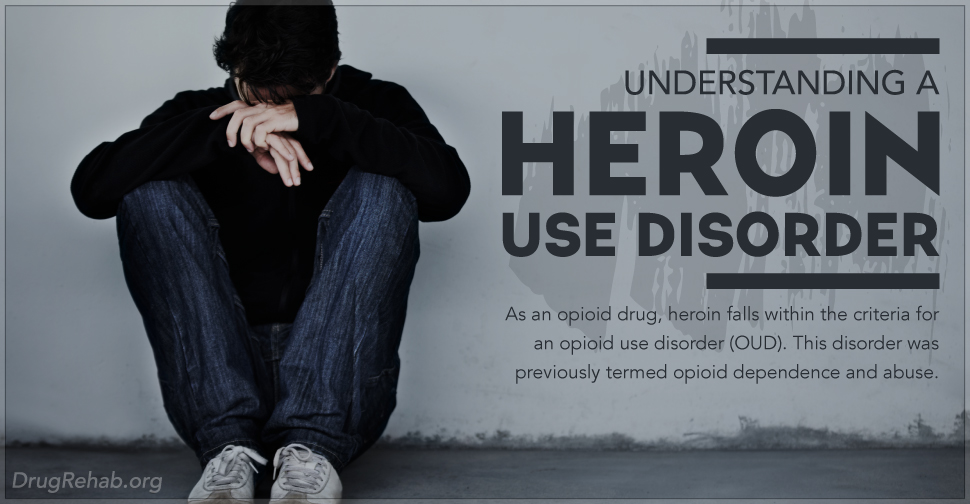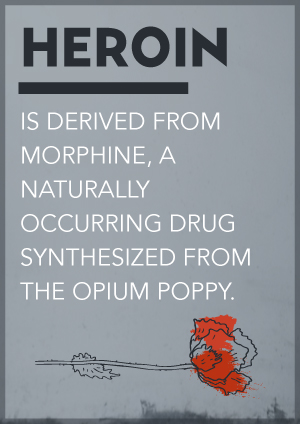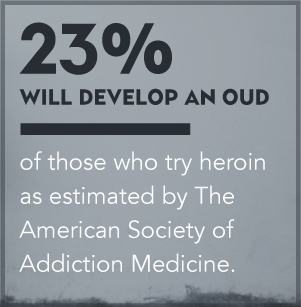
Because heroin is an opioid, individuals that abuse the drug have an opioid use disorder (OUD). This disorder was previously termed opioid dependence and abuse. A heroin-related OUD causes impairment and distress to the user within a period of one year. A heroin use disorder (HUD) includes patterns and behaviors which many commonly refer to as abuse and addiction.
Heroin is highly addictive and may cause coma, brain damage, and death. Heroin use and heroin-related overdose deaths are on the rise among most U.S. demographics. Fortunately, treatment exists which can help you or your loved one achieve a sober and more balanced life.
What Is Heroin?
 Heroin is one of the most addictive illicit drugs known to man. Heroin is derived from morphine, a naturally occurring drug synthesized from the opium poppy. It is found in one of two ways, either as a white or slightly brown powder or in black tar form. When a person uses heroin, the drug causes an excess of dopamine to build up in the brain. The overabundance of this chemical causes the pleasurable rush and euphoric state that heroin abusers seek.
Heroin is one of the most addictive illicit drugs known to man. Heroin is derived from morphine, a naturally occurring drug synthesized from the opium poppy. It is found in one of two ways, either as a white or slightly brown powder or in black tar form. When a person uses heroin, the drug causes an excess of dopamine to build up in the brain. The overabundance of this chemical causes the pleasurable rush and euphoric state that heroin abusers seek.
Users may abuse the drug in the following ways: intravenously (injecting), insufflation (snorting), or by smoking it. Typically, the more pure, powdered forms are snorted or smoked whereas impure heroin (black tar) can only be injected. No matter how an individual chooses to abuse this drug, you still face risks of addiction, disease, and death.
What Is The Criteria Of A Heroin Use Disorder?
The American Psychological Association (APA) defines an OUD as “a problematic pattern of opioid use leading to clinically significant impairment or distress, as manifested by at least two of the following, occurring within a 12-month period.” These criteria, as outlined by the APA include that an individual:
- Takes a greater dose of heroin or continues to use for a period of time that lasts beyond what they intended.
- Is not able to decrease their heroin use despite a desire or an attempt to do so.
- Spends increasing amounts of time seeking or using the drug and/or recovering from ill effects associated with heroin abuse.
- Experiences cravings or an intense urge to use heroin.
- Persists at using heroin even though it is creating or worsening relationships or other social obligations.
- Decreases or completely stops taking part in job-related, social, or recreational obligations or events due to their heroin use.
- Consistently uses heroin in a way which exposes them to physical dangers.
- Does not stop using the drug even though they know it is causing or worsening a physical or psychological condition.
- Experiences a tolerance. Specifically, the amount of drug they previously used does not create the same effects, leading them to use more to gain the pleasurable feelings they seek.
- Experiences heroin withdrawal if they suddenly stop using. A person may continue to take the drug in an attempt to avoid withdrawal symptoms.

Withdrawal symptoms may include muscle and bone aches, uncontrollable leg movements, goosebumps and chills, nausea and vomiting, insomnia, nervousness or anxiety, intense cravings, and more.
What Are Other Signs And Symptoms Of A Heroin Use Disorder?
Are you concerned that your loved one is experimenting with heroin or suffering from an HUD? Being on the look out for the following signs and symptoms can help you to identify if you loved one may be at risk for an HUD. If a person is using heroin, they may:
- Have a decreased sense of pain.
- Have warm and flushed skin.
- Complain of a dry mouth.
- Become very itchy.
- Have small (pinprick) pupils.
- Feel like their limbs are very heavy.
- Seem to move very slowly.
- Become nauseous and even vomit.
- Alternate between drowsiness and wakefulness.
- Have slowed thinking.
- Decreased heart and breathing rates.
- Have track marks on their arms from injecting the drug.
- Wear long sleeves in warm weather to cover up these marks.
- Steal money or objects to pay for their habit.
- Withdraw from their loved ones.
- Lose interest in hobbies, friends, or things they previously enjoyed.
- Begin struggling at work or school or even quit or get fired/kicked out.
- Become evasive or lie if you try to talk to them about the drug or their behaviors.
Heroin use requires certain equipment. Knowing what to look for can help you to spot a problem. These items may include straws or hollowed out pens (for snorting), syringes, lengths of tube or belts (to tie off with prior to injection), and/or a metal or glass pipe. Many people may keep these supplies in a kit or bag.
What Are The Risks And Dangers Of Heroin?
Addiction is one of the biggest dangers of heroin use. The American Society of Addiction Medicine estimates that of those who try heroin, 23 percent will develop an OUD. An HUD may also cause:
- Financial and legal problems
- Loss of job
- Marriage problems
- Child custody battles
- Infectious diseases (HIV/AIDS, hepatitis B and C)
- Scarring and infection at the injection site
- Collapsed veins
- Miscarriage
- Irregular menstrual cycles for women
- Sexual dysfunction for men
- Mental health disorders (depression and antisocial personality disorder)
- Heart trouble
- Other organ complications and damage
- Withdrawal
Other severe risks include coma, overdose, and death. Overdose can occur even on the first use. According to the CDC, since 2010 deaths related to heroin have quadrupled. To further avoid these risks, it is urgent that you or your loved one get treatment. While an HUD is a pattern over a year, some individuals might get addicted much sooner. Don’t wait, start exploring your treatment options today.
How Do You Treat A Heroin Use Disorder?
Due to the intensely addictive properties of this drug, we highly recommend medically supervised detox and inpatient drug rehab. Detoxing from heroin can be very unpleasant, painful, and even dangerous. This is why you should never attempt to do this on your own.
Certain medications or pharmacotherapies may be used during detox and/or treatment. The following medications are supported by the National Institute on Drug Abuse as evidence-based practices.
- Buprenorphine
- Methadone
- Naltrexone
These drugs treat symptoms of withdrawal and cravings and may also be used as maintenance medications. Other medications may be used to treat any co-occurring disorders.
These medications are best supported by certain behavioral therapies as part of medication-assisted treatment (MAT). This integrative method addresses a person’s physical, mental, and emotional needs in one comprehensive approach.
An individualized rehab program for an HUD may use a variety of treatment modalities, including cognitive behavioral therapy, dialectical behavioral therapy, and motivational interviewing. A thorough program should also offer individual and/or group therapy, family therapy and support, relapse prevention, and aftercare support. Every treatment program is different. Some may also offer holistic therapies, men’s or women’s only treatment programs, adventure therapy, equine therapy, art therapy, and more.
Don’t Let Heroin Rule Your Life Any Longer
While a heroin use disorder is a serious problem, it is not un- treatable. DrugRehab.org wants you or your loved one to succeed and find a fulfilling, drug-free life. Our treatment specialists can help you find the right program that fits your individual needs. Take the first step into living a life free from heroin—contact us today.
For More Information Related to “Understanding A Heroin Use Disorder” Be Sure To Check Out These Additional Resources From DrugRehab.org:
Using Naltrexone To Treat Opioid Addiction
Utilizing Equine Therapy In Addiction Treatment
What Are The Side Effects Of Heroin Use?
The Dangers of Snorting Oxycontin (Oxycodone)
Sources
The National Institute on Drug Abuse — Heroin: Research Report Series

